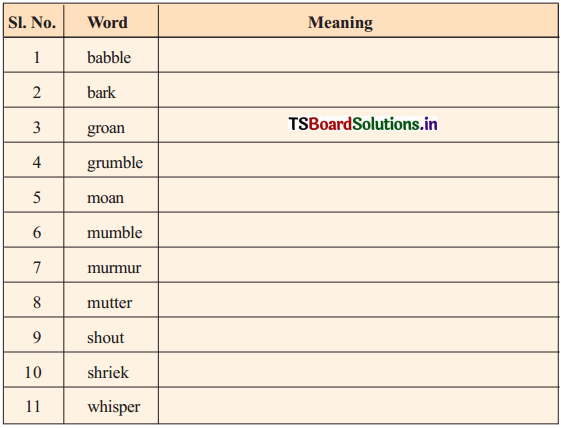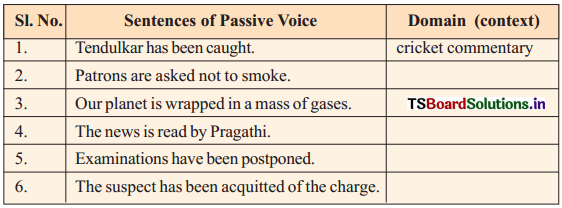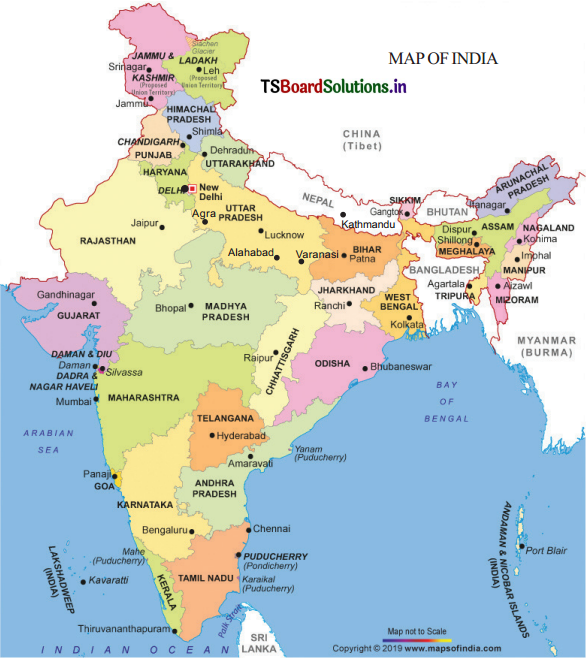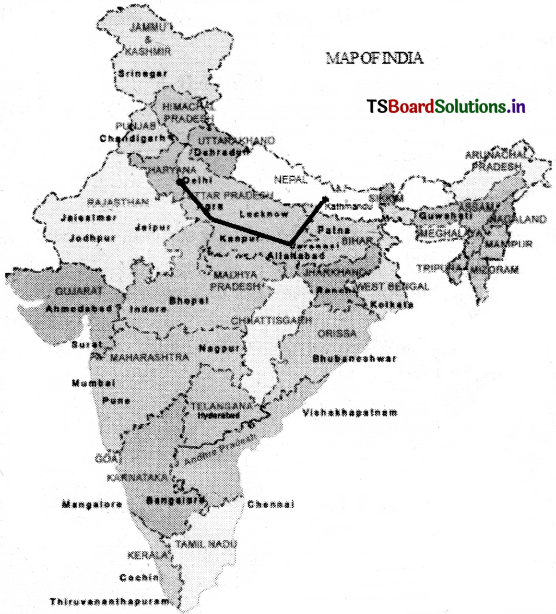TS Board Telangana SCERT Class 9 English Solutions Unit 8A The Accidental Tourist Textbook Questions and Answers.
TS 9th Class English Guide Unit 8A The Accidental Tourist
PRE-READING (Motivation/Picture Interaction) :
Look at the pictures and answer the questions that follow.

Question 1.
What are these pictures about ?
Answer:
The pictures are about ‘tourist attractions’ /tourism.
Question 2.
Have you ever visited such places ?
Answer:
Yes, I have visited such places.
Question 3.
In what way are these places worth visiting ?
Answer:
The places are worth visiting for their temples, monuments, places of historical significance.
![]()
ORAL DISCOURSE:
Question.
Description – Describe a place that you have visited recently.
Answer:
Recently I had a chance to visit Salarjung Museum of Hyderabad which was established in 1951. I Was amazed to see the rich collection of arts and antiques of European, Middle Eastern as well as far Eastern regions. It has a large collection of ancient Arabic and Persian manuscripts and a well equipped library. There are separate galleries for ivory carvings, modern India paintings and marble sculptures, toys and dolls, etc.
Looking at vast collection of historical items, it was declared an institution of national importance in May 1961. All the unique items in this museum reflect grandeur and royalty, making everyone awestmck about them. In my opinion, everyone should visit this museum at least once in a life time if they ever get a chance to visit it. The museum is worth-visiting.
Comprehension:
Answer the following questions.
Question 1.
How did the card of British Airways’ frequent flyer programme trouble the narrator?
Answer:
The narrator wanted to show the British Airways’ frequent flyer programme card to the authorities. But it was in the carry-on bag. He tried to open the bag but the zip on the bag was jammed. So, he pulled on it and yanked at it with a jerk. The zip gave away abruptly. The side of the bag flew open and all the things in it were spread all over in the centre of the air¬port. He had gashed his finger on the zip. This is how the narrator was troubled.
Question 2.
The narrator’s wife looked at him with an expression of wonder. What might the reason be?
Answer:
The narrator is busy on a job. He was carrying several things with him. The narrator’s wife had seen all of them when it was abruptly opened spread all over. The reason for her wonder might be the way he has created a mess all around himself.
Question 3.
The narrator lamented that he had met with many catastrophes in his travel. What were they? Do you think they were real catastrophes?
Answer:
Once on an aeroplane, he leaned over to tie a shoelace just at the moment someone in the seat ahead of him threw his seat back into full recline and he found himself in the crash position. On another occasion, he knocked a soft drink onto the lap of a sweet little lady sitting beside him. The flight attendant brought him a replacement drink and instantly he knocked it onto the woman again. They were not real catastrophes. They were just accidents by mistake due to confusion.
![]()
Question 4.
How did the narrator free himself from the crash position?
Answer:
The narrator leaned down to tie his shoelaces. In the meantime the person on the seat ahead of him pushed back his seat. As a result he got stuck in kneel down position. He managed to get himself free by clawing the leg of the man sitting next to him.
Question 5.
Do you think the narrator’s hands are like some cheap prop? If yes, what made you think so?
Answer:
The narrator knocked the soft drink onto the lap of a sweet lady sitting beside him twice in confusion. He said that he did not know how he did that mindless act. From this, I think that his hands had acted like some cheap prop.
Question 6.
Why did the narrator’s wife say to the children, “Take the lids off the food for Daddy”?
Answer:
His wife knew his knack of creating misery for himself. As a precautionary measure she asked her children to do normal chores for their father.
Question 7.
Did the narrator do all the awkward things intentionally or accidentally? Give your reasons.
Answer:
The narrator does not do anything intentionally. He is by nature a man of confusion. He himself had admitted that he gets confused easily. He had many experiences during the travelling.
Question 8.
What kind of person was the narrator? How can you justify your opinion?
Answer:
The narrator cannot do a simple day to day activity without confusion. He often forgets the way to lavatory. He finds it difficult to remember his hotel room number. He forgets almost everything which is required to carry out his routine activity. Most of us never ponder how effortlessly we carry out our routine activity. The routine things are fixed in our brains. But some people, like the narrator find it difficult and almost impossible.
![]()
II. Here is a list of actions in the story. Put a tick (✓) against the actions performed by the narrator.
Yanked the bag-zip
Gashed finger on the zip
Tied a shoe lace
Clawed the leg of woman
Knocked a soft drink
Sucked the end of a pencil
Ate tobacco
Stored letters
Leaned back in the plane
Presented a photo
Answer:
| Yanked the bag zip | ✓ |
| Gashed finger on the zip | |
| Tied a shoe lace | ✓ |
| Clawed the leg of woman | |
| Knocked a soft drink | ✓ |
| Sucked the end of a pencil | ✓ |
| Ate tobacco | |
| Stored letters | |
| Leaned back in the plane | |
| Presented a photo |
Vocabulary:
Read the following sentence and observe the underlined word.
Living in the real world is perhaps most outstanding.
What meaning does the underlined word convey in the sentence?
As you perhaps know, outstanding is a compound word, containing out + standing. Here the word ‘outstanding’ means very important.
Look for such compound words, if any, in the lesson.
Answer:
- every+body = everybody
- with + out = without
- carry + on = carry-on
- every + thing = everything
- with + in = within
- news + paper = newspaper
- dumb + stick = dumbstruck
- an + other = another
- note + book = notebook
I. Prepare a list of five such words and find their meanings with the help of a dictionary / your teacher.
Answer:
- dumbstruck : unable to speak because of surprise
- shoelace : a long thin piece of material like string that goes through the holes on a shoe and is used to fasten it.
- outside : the outer side or surface of something
- thoughtfully : showing signs of careful thought
- air line : a company that provides regular flights to take passengers and goods to different places.
![]()
II. Read the following sentences and observe the underlined words.
- I don’t eat, drink or lean over to tie my shoe laces.
- I just remember reaching out for the new drink.
In the first sentence ‘drink’ means ‘take in’ or ‘consume’. In the second sentence ‘drink’ means ‘beverage’. The word ‘drink’ is a homonym. A homonym is a word that is spelt and pronounced like another word but has another meaning.
Here is a list of words. Use them in sentences to give two different meanings.
fair, bank, left, saw, bear, right, interest, like, can, row, minute, second
Answers:
1. fair = acceptable and appropriate in a particular situation.
e.g. : The punishment given to the prisoner was very fair.
fair = an event at which people, business etc., show and sell their goods
e.g. : I bought vegetables in this village fair.
2. bank = an organization that provides various financial services
e.g. : I often go to bank to deposit money.
bank = the side of a river, canal, etc.
e.g. : He lives on the banks of the river Godavari.
3. left = went away from a person or a place
e.g. : He left for Delhi an hour ago.
left = opposite of right
e.g. : He fell down and broke his left leg.
![]()
4. saw = a tool that has a long blade with sharp points
e.g. : They cut the tree with a big saw.
saw = past form of see means look
e.g. : I saw a man crossing the road.
5. bear = to be able to accept and deal with something unpleasant
e.g. : I cannot bear having cats in the house.
bear = a heavy wild animal with thick fur and sharp claws
e.g. : There are many bears in this forest.
6. right = a moral or legal claim to have something
e.g. : We have fundamental rights in India.
right = true or correct as a fact
e.g. : Raju, your answer is right.
7. interest = the feeling that you have to know or learn more about something
e.g. : I have no interest in watching cricket.
interest = the extra money that you pay at the time of borrowing or receive at the time of lending
e.g. : I borrowed money on interest.
8. like = similar to somebody or something
e.g. : He is very like his father.
like = prefer to do something
e.g. : I like to go to bed early.
![]()
9. can = a word that is used to say something is possible for somebody
e.g. : He can run like a horse.
can = a container made of any metal or plastic for carrying something
e.g. : She is carrying an oil can now.
10. row = a number of people or objects in a line
e.g. : We usually sit in the front row in our class.
row = to have a noisy argument
e.g. : Sindhu and Ganesh are always rowing.
11. minute = equal to 60 seconds
e.g. : Wait a minute if you want to meet me.
minute = extremely small
e.g. : I got a minute profit in my business.
12. second = happening or coming next after the first
e.g. : Sulochana is the second to arrive at the station.
second = a very short time
e.g. : I will be with you in a second.
![]()
III. Read the following sentences.
The zip on the bag was jammed. So I pulled on it and yanked at it, with grunts and frowns.
Here the underlined word ‘grunt’ is a short low sound in the throat to show annoyance, pain and disinterest. It is a sound-word.
Here are a few other sound words. Find out their meanings with the help of a dictionary / your teacher.

Answer:
| Word | Meaning |
| 1. babble | the sound of many people speaking at the same time or the sounds a baby makes before beginning to say actual words |
| 2. bark | the short loud sound made by dogs and some other animals |
| 3. groan | to make a long deep sound because you are annoyed, upset, or in pain, or with pleasure or moan |
| 4. grumble | to complain about someone or something in a bad tempered way |
| 5. moan | to make a long deep sound, usually expressing unhappiness, suffering, or physical pleasure or groan |
| 6. mumble | to speak or say something in a quiet voice, in a way that is not clear |
| 7. murmur | to say something in a soft, quiet voice that is difficult to hear or understand |
| 8. mutter | to speak or say something in a quiet voice that is difficult to hear, especially because you are annoyed about something |
| 9. shout | to say something in a loud voice; to speak loudly/angrily to someone, e.g. : Stop shouting and listen! |
| 10. shriek | to give a loud, high shout, for example when you are excited, frightened, or in pain |
| 11. whisper | to speak very quietly to someone so that other people cannot hear what you are saying or murmur. |
![]()
Grammar:
I. Passive Voice
Here are two sentences taken from the text ‘Kathmandu’.
1. A corpse is being cremated on its banks.
2. Tibetan prints and silver jewellery can be bought here.
In both the sentences the agent of the action is not mentioned. In the two sentences the subjects are passive because something is being done to them rather than they are doing something.
In the first sentence the subject ‘A corpse’ is followed by the helping verb ‘is’, be form ‘being’ and the past participle form of the verb ‘cremate’.
In the second sentence the subject ‘Tibetan prints and silver jewellery’ is followed by the helping verb can, be form ‘be’ and the past participle form of the main verb ‘buy’.
As you can see. the agent of the passive voice is not mentioned, when it is unknown, not considered important, not desirable to inform or so obvious from the context. Passive voice is generally used (when we want) to emphasize the activity rather than the doer.
Exercise – 1:
Now pick out the sentences in the Passive Voice from the text “The Accidental Tourist”.
Answer:
- The zip on the bag was jammed.
- The side of the bag flew open and everything within – newspaper cuttings and other loose papers, a 14-ounce tin of pipe tobacco, magazines, passport, English money, film – was extravagantly ejected over an area about the size of a tennis court.
- Now on planes when the food is delivered, my wife says: “Take the lids off the food for Daddy” or “Put your hoods up, children.”
![]()
Exercise – 2:
Here are some sentences in the passive voice. Read them carefully and say which domain they belong to. One has been done for you.

Answer:
| Sentences of Passive Voice | Domain (Context) |
| 1. Tendulkar has been caught. | cricket commentary |
| 2. Patrons are asked not to smoke. | invitation and hospitality |
| 3. Our planet is wrapped in a mass of gases. | science |
| 4. The news is read by Pragathi. | media/news reading |
| 5. Examinations have been postponed. | education/studies |
| 6. The suspect has been acquitted of the charge. | crime/judgement |
![]()
Writing:
Read this letter.
St. Paul’s Avenue,
Boston.
9th March.
Dear W. Bryson,
Hope you are doing well by the grace of God.
I always remember the days we spent at different tourist places last summer.
Here is an important matter I would like to bring to your notice. Very recently when I was on my journey, the airport clerk examined my ticket and travel cards and pointed out that the card with me was your card.
I think the exchange of our cards might have taken place when we met at the hotel recently. Hope you will check and send my card at the earliest.
Anyhow, here I am enclosing your card.
With best regards.
Yours affectionately,
Bill Bryson.
To
Mr. W. Bryson,
7-18-02,
St. John’s Avenue,
Washington.
Imagine that you were W. Bryson and write a reply to Bill Bryson expressing his regret for this blunder.
Answer:
St. John’s Avenue,
Washington.
14th March.
Dear Bill Bryson,
Thanks for your letter. The memories of the summer we spent together at different tourist places is still fresh in my memory.
I regret to know that you have been put to a lot of inconvenience due to the exchange of our cards. It is quite surprising that I too haven’t noticed the mix up so far. I guess that it all happened at the hotel in which we stayed that night.
I am sending you your card.
With best regards.
Yours affectionately,
Bill Bryson.
To
Mr. Bill Bryson,
6-20-05, St. Paul’s Avenue,
Boston.
![]()
Study skills:
I. On the following map, mark the route, which the author thought of but did not take, to Delhi. (C. Reading)

Answer:

![]()
II. Find out the possible routes (by rail, road or air) from Kathmandu to New Delhi/ Mumbai/Kolkata/ Chennai/Hyderabad.
Answer:
- Road way from Kathmandu to New Delhi
Kathmandu- through Uttar Pradesh to New Delhi. - Road way route from Kathmandu to Mumbai
Kathmandu through Uttar Pradesh and Madhya Pradesh to Mumbai, Maiharashtra. - Road way from Kathmandu to Kolkata
From Kathmandu through Uttar Pradesh, Bihar, Jharkhand and to Kolkata. - Road way from Kathmandu to Chennai
From Kathmandu through Uttar Pradesh, Bihar, Jharkhand, Chhattisgarh and to Chennai. - Roadway from Kathmandu to Hyderabad
From Kathmandu through Gorakhpur, Faizabad, Lucknow, Kanpur, Jhansi, Sagar, Narsinghpur, Seoni, Nagpur, Hinganghat, Adilabad, Nirmal, Armur, Kamareddy and to Hyderabad.
Listening:
Listen to the speech on“Tourism in India” by your teacher and answer the following questions.
A Speech on tourism in lndia
“It gives me great pleasure to be present here today amongst all of you, the stalwarts of the Indian Travel and Tourism Industry, to celebrate the coming of a new era in the industry.
It is evidenced that tourism is a major driver of economic growth globally. For a country like ours, Tourism Sector is not only a major contributor to the growth of the economy but a generator of employment opportunities as well.
The Government primarily plays the role of a facilitator, acting as a catalyst for the development and promotion of tourism. It is absolutely imperative that we not only maintain the quality of facilities and services offered, but also bring them at par with the best in the world.
Realizing that development of infrastructure holds the key to the growth of tourism, the Government is investing heavily for integrated development of the Infrastructure Sector. All possible steps are being taken to promote tourism related infrastructure. We are encouraging the Hotel and Travel Industry, developing tourism circuits, working towards preservation of monuments, human resources development, and upgradation of information technology.
As the minister of tourism, I would like to mention here that, in our effort to develop and promote tourism, we have also to keep in mind the importance of sustainable tourism and the need of protecting our environment. India, a region with the world’s greatest bio-diversity and varied natural locals, is an ideal destination for eco-tourism. We recognize the importance of cleanliness, general hygiene and sanitation in making India a memorable tourist destination. In the longer run, this would ensure provision of a better quality of life to our own citizens.
Domestic tourism is a big contributor to the growth of this sector. The number of domestic tourists is increasing every year.
I would once again like to congratulate all of you who have won the Express Travel World Awards. I would also like to congratulate all those who have been nominated for the award and wish them all the best for the coming year so that they could also be in the list of recipients next year.”
“Jai hind”.
![]()
Now, answer the following questions.
Question 1.
Who is the speaker of this speech?
Answer:
The minister of tourism.
Question 2.
What is the occasion mentioned in this speech?
Answer:
To celebrate the coming of a new era in the industry.
Question 3.
What role does the Government play for the development and promotion of tourism?
Answer:
The Government primarily plays the role of a facilitator, acting as a catalyst for the development and promotion of tourism.
Question 4.
Which thing holds the key to the growth of tourism according to the speaker?
Answer:
Development of infrastructure holds the key to the growth of tourism.
Question 5.
What, according to the speaker, would ensure provision of a better quality of life to our own citizens?
Answer:
Cleanliness, general hygiene and sanitation would ensure provision of a better quality of life to our own citizens.
![]()
Oral Activity:
Talk about any tourist place or pilgrim centre place that you visited during holidays.
Keep the following things in mind.
- What place did you visit?
- When did you visit that place?
- What did you see there?
- What were the interesting things you found there?
- What facilities were there?
- How did you enjoy yourself?
- Does the place have any historical importance?
Answer:
I am happy to share my memories of our visit to Nagarjuna Sagar. We visited the place during Dasara vacation because it is the appropriate time to visit that place.
Nagarjuna Sagar is a multipurpose project which is constructed on the river Krishna in Nalgonda district. It is 145 kms from my native city Khammam. It is one of the most prominent Buddhist centers and attractive tourist spots in Telangana. In ancient days it was known as Vijayapuri. Nagaiuna Sagar takes its present name from Achaa Nagarjuna who was one of the most revered Buddhist monks. It is also a place of immense archaeological significance and excavations. Nagaijuna Sagar was regarded as a centre for the propagation of Buddhist teachings in South India.
The dam was full with water. Nagaijuna Sagar is the third Largest man-made lake in the world which stores water to the extent of 408 tmcft at its full level. It was built at a cost of Rs. 91 crores.
We visited Nagarjunakoncla, an interesting island museum, located in the midst of the Nagarjuna Sagar Lake. The museum houses significant relics of Buddhist culture and art that make it an important place to visit during a tour to Nagarjuna Sagar. Mahachaitya, the main stupa of the museum contains relics of Buddha.
We have also visited the electric power station. It is one of the earliest hydro-electric projects of india. On the whole it was a memorable trip.
![]()
The Accidental Tourist Summary in English
The Accidental tourist is a humorous story. The narrator. Bill Bryson, narrates his experiences as an air traveler. He is a man of confusion. There were many things that he could not properly do due to confusion. He goes many times to lavatory in a cinema but standing in an alley on the wrong side of the self locking door. He often forgets the number of his room and goes 2-3 times a day at the hotel reception to enquire about it.
Once he went on a visit to England along with his family for a week on Easter. The narrator was a cardholder of the British Airways frequent flyer programme. On the airport he wanted to show that discount card in his bag. He tried to open the bag and the zip harder. The zip broke and the bag opened abruptly. Everything in his bag rained out and spread around irregularly. His wife wondered at her husband’s absentmindedness.
He had many experiences while travelling by flights. Once he was in a helpless crash position when he leaned over to tie his shoelaces and someone in the seat ahead of him threw his seat back into full recline. On another occasion, he knocked soft drinks into the lap of a lady sitting beside him. The worst experience he had was that when he got his mouth, chin, gums and tongue became blue cloured. He was writing some thoughts on a paper. He fell onto conversation with a lady sitting next to him he had put his pen in his mouth. It leaked and his mouth was covered with ink. He did not realize it until he went to the lavatory.
The narrator was so fed up with his eating habit that he preferred not to eat while on board. His wife used to take some precautions. She told the children to take the lids off the food for him or put their hoods up when daddy cuts his meat.
He often forgot to ask for air miles. He could never take benefits from the discount schemes.
It was his state of mind that he lost a golden opportunity to avail himself of a first class flight to Bali.
![]()
About the Author:
William Me Guire “Bill” Bryson, (born on December 8, 1951) is a best-selling American author of humorous books on travel, as well as books on the English language and on science. Born an American, he was a resident of Britain for most of his adult life before returning to the US in 1995. In 2003 Bryson moved back to Britain.
Bryson shot to prominence in the United Kingdom with the publication of Notes From A Small Island (1995). An Exploration of Britain, for which he made an accompanying television series. He received widespread recognition again with the publication of A Short History of Nearly Everything (2003). which popularised scientific questions for a general audience.
Glossary:
alley (n) : a narrow passage-way between or behind buildings
en famille (adv) : with one’s family
grunt (n) : a short low sound in the throat to show pain and anger
consternation (n) : surprise, shock or anxiety
budge (v) : to move slightly
yank (v) : pull with a jerk
extravagantly (adv) : very extremely
oblivion (n) : a state in which one is not aware of what is happening around.
concourse (n) : the open central area in a large public building (here, in the airport)
disgorging (v) : pour something out in large quantities
exasperation (n) : irritation
catastrophe (n) : a sudden event that causes many people to suffer
perch (n) : a place or position
urbane (adj) : polished and cultured
bons mots : clever remarks
suave (adj) : sophisticated, polite
seismic event (n.phr) : a powerful happening like an earthquake